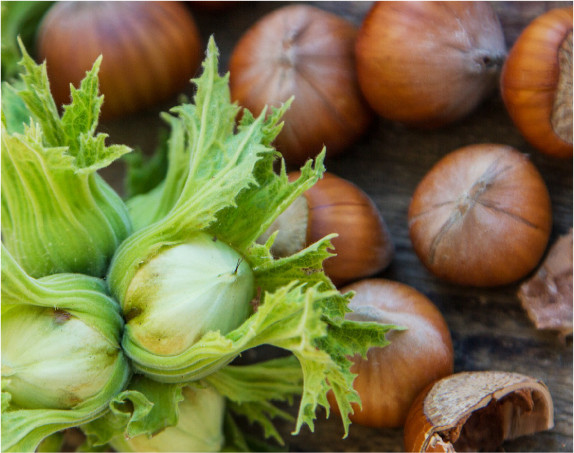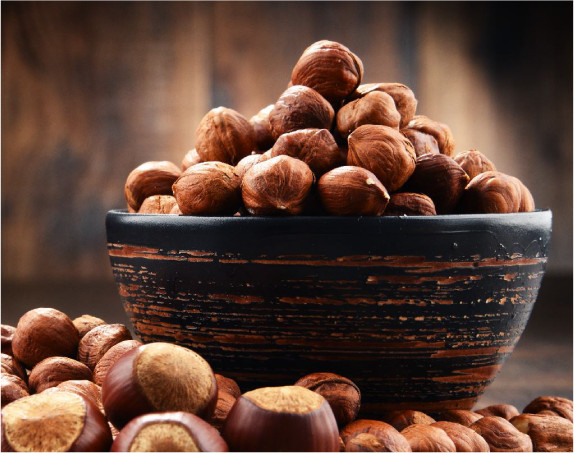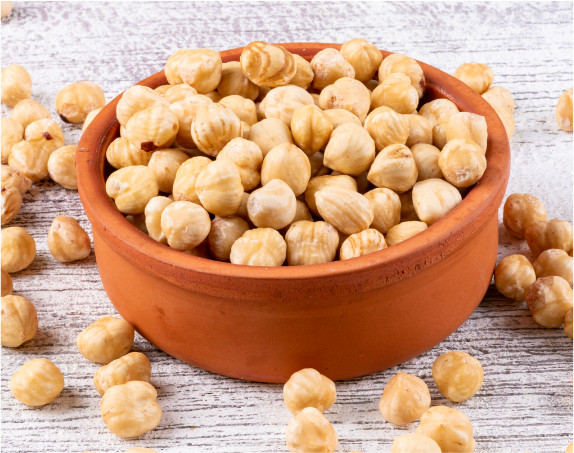HAZELNUT

TURKEY, THE HOMELAND OF HAZELNUT
The hazelnut (Corylus avellana L) which is grown as the most widespread one of the nuts all over the world, grows under appropriate climate special to itself and its homeland is Turkey, is one the most significant agricultural products of our country. Turkey is the world's most important producer of hazelnuts with average production of 650.000 tons and with an area of 705.000 ha. Hazelnut, with its superior quality, is one of the strategic products of our country that dominate the world market in terms of both production and export.
The cultural history of hazelnut is based on very old years. Known as the oldest source in the Uyghur epics in 2838 BC hazelnuts are mentioned. Again, Anatolia is the homeland of hazelnuts and is known as the place where cultural history began. The cultural varieties of hazelnuts were brought from Anatolia to Greece and Italy, and in the following years they were delivered to the American continent.

In the travel book of Evliya Çelebi (1650), it is mentioned that "Trabzon province (from Giresun to Trabzon) is covered with hazelnut and it is expressed as “the tree of peace". The most dominant production area of hazelnuts, especially the provinces of Ordu and Giresun is located in Turkey Eastern Black Sea region.
Hazelnut is found as the main product along the East Black Sea coastline, it spreads 30 km inland from the beach and up to 750 m altitude. The most important variety is Tombul and it is usually grown as monoculture.
The Turkish Hazelnuts are divided into two categories as Giresun and Levant in terms of quality. Giresun quality hazelnuts are high in fat, thin-shelled and have a high rate of skin removal. With Tombul hazelnuts placed throughout the province of Giresun, they are grown in some regions in Trabzon. Levant quality hazelnut is the common name given to all hazelnuts produced in regions outside the production region of Giresun quality hazelnuts.

These hazelnuts, which are named as Levant Akçakoca, Levant Ordu, Levant Trabzon and Levant Samsun, according to the place where they are grown, although they contain less fat than Giresun quality hazelnuts, they generally have a higher fat ratio than hazelnuts grown in other countries and are superior in terms of taste.
Hazelnut export is very important for Turkish economy in terms of export revenues. Turkey carries alone 70% of world hazelnut production. In addition, Turkey's shelled hazelnut exports covering 80% of the Turkey’s total export volume of hazelnuts, carries 75% of world hazelnut export volume. Hazelnut is still in the first rank among Turkey's agricultural product exports with export share of 15-20% and %2 share in total exports.

Turkey's hazelnut exports, generally takes place in two main groups of natural hazelnuts and processed hazelnuts. With the establishment of advanced hazelnut processing units, it is seen that the share of processed hazelnut products is increasing. The usage area of hazelnut, which was previously consumed as a nut / snack, has expanded with the development of the food industry. Hazelnut; It is used as an ingredient in the production of chocolate, biscuit, confectionery, dessert, cake and ice cream. In the world, hazelnuts are consumed by 70% in the chocolate industry, 15% in the confectionery industry, 10% as a snack and 5% in other areas.
Turkish hazelnuts are also very important in terms of human nutrition and health, thanks to the type of fat and fatty acids, protein, carbohydrate, dietary fiber, vitamins and minerals it contains.

It contains energy and all nutrients necessary for human life, excluding vitamins A, C and B12. In numerous community studies conducted around the world, it has been stated that consuming hazelnuts in the daily diet significantly reduces the risk of death and disease from heart diseases, as well as contributing to the prevention of other chronic diseases defined as metabolic syndrome.






